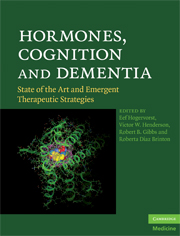Book contents
- Hormones, Cognition and Dementia
- Hormones, Cognition and Dementia
- Copyright page
- Contents
- Contributors
- Preface
- Section 1 Estrogens and cognition: perspectives and opportunities in the wake of the Women's Health Initiative Memory Study
- Chapter 1 Women's Health Initiative Memory Study (WHIMS) program: emerging findings
- Chapter 2 Identifying risk factors for cognitive change in the Women's Health Initiative: a neural networks approach
- Chapter 3 Estrogen therapy – relationship to longevity and prevalent dementia in the oldest-old: the Leisure World Cohort Study and the 90+ Study
- Chapter 4 The critical window hypothesis: hormone exposures and cognitive outcomes after menopause
- Chapter 5 Animal studies that support estrogen effects on cognitive performance and the cholinergic basis of the critical period hypothesis
- Chapter 6 The healthy cell bias of estrogen action through regulating glucose metabolism and mitochondrial function: implications for prevention of Alzheimer's disease
- Section 2 Varieties of estrogenic therapy
- Section 3 Potential modulators and modifiers of estrogenic effects
- Section 4 Possible genetic factors related to hormone treatment effects
- Section 5 Testosterone, estradiol and men, and sex hormone binding globulin
- Section 6 Gonadotropin effects
- Index
- Plate Section
Chapter 5 - Animal studies that support estrogen effects on cognitive performance and the cholinergic basis of the critical period hypothesis
from Section 1 - Estrogens and cognition: perspectives and opportunities in the wake of the Women's Health Initiative Memory Study
Published online by Cambridge University Press: 06 July 2010
- Hormones, Cognition and Dementia
- Hormones, Cognition and Dementia
- Copyright page
- Contents
- Contributors
- Preface
- Section 1 Estrogens and cognition: perspectives and opportunities in the wake of the Women's Health Initiative Memory Study
- Chapter 1 Women's Health Initiative Memory Study (WHIMS) program: emerging findings
- Chapter 2 Identifying risk factors for cognitive change in the Women's Health Initiative: a neural networks approach
- Chapter 3 Estrogen therapy – relationship to longevity and prevalent dementia in the oldest-old: the Leisure World Cohort Study and the 90+ Study
- Chapter 4 The critical window hypothesis: hormone exposures and cognitive outcomes after menopause
- Chapter 5 Animal studies that support estrogen effects on cognitive performance and the cholinergic basis of the critical period hypothesis
- Chapter 6 The healthy cell bias of estrogen action through regulating glucose metabolism and mitochondrial function: implications for prevention of Alzheimer's disease
- Section 2 Varieties of estrogenic therapy
- Section 3 Potential modulators and modifiers of estrogenic effects
- Section 4 Possible genetic factors related to hormone treatment effects
- Section 5 Testosterone, estradiol and men, and sex hormone binding globulin
- Section 6 Gonadotropin effects
- Index
- Plate Section
Summary
Gibbs reviews the basic science, animal and neurochemical data, regarding estrogens and cognitive function. Importantly, estrogenic regulation of cognitive function is selective and does not affect all types of cognitive function but instead selectively affects specific types of behaviors. He goes on to review the impact of combination hormone therapy (HT) on cognitive performance and basic science investigations of the critical period of hormone intervention hypothesis. These findings indicate that estradiol enhancement of cognitive performance is lost over time following ovariectomy, which is consistent with Gibbs's cholinergic hypothesis and the critical window of therapeutic opportunity hypothesis (see Chapter 4). Results derived largely from rodent studies suggest that estradiol regulation of basal forebrain cholinergic neurons plays an important role in the regulation of select types of cognitive function, and may provide a mechanistic foundation for the critical period hypothesis. Gibbs proposes that identifying the specific neural circuits that account for the task-selective effects of estradiol, as well as the mechanisms by which these effects are mediated by basal forebrain cholinergic neurons, will aid in the proper use and timing of HT in postmenopausal women to sustain cognitive performance and prevent age-related cognitive decline and dementia.
- Type
- Chapter
- Information
- Hormones, Cognition and DementiaState of the Art and Emergent Therapeutic Strategies, pp. 45 - 54Publisher: Cambridge University PressPrint publication year: 2009
- 2
- Cited by



